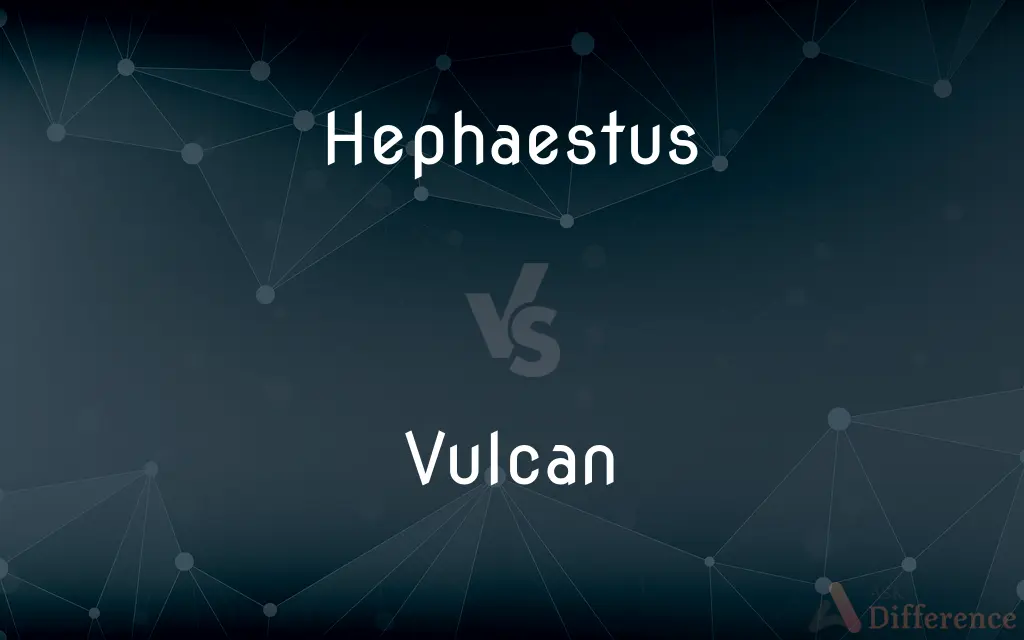Hephaestus vs. Vulcan — What's the Difference?
By Urooj Arif & Fiza Rafique — Updated on April 24, 2024
Hephaestus is the Greek god of fire and metallurgy, celebrated for his craftsmanship, while Vulcan, his Roman counterpart, is similarly revered but more directly associated with volcanic fire and destructive aspects.

Difference Between Hephaestus and Vulcan
Table of Contents
ADVERTISEMENT
Key Differences
Hephaestus is a central figure in Greek mythology known for his skill in blacksmithing and crafting, creating weapons and armor for the gods. On the other hand, Vulcan, in Roman mythology, embodies not only the forge but also the destructive power of fire, including volcanoes and earthquakes. His festivals emphasized this aspect.
In Greek myths, Hephaestus is often depicted as the kindly, peace-loving, and crippled god who uses his talent to aid heroes and gods alike. Whereas Vulcan's Roman tales emphasize his volatile nature and his association with the fiery and unpredictable forces of the Earth.
Hephaestus is married to Aphrodite, the goddess of love and beauty, which highlights his role in creating beautiful, intricate objects. In contrast, Vulcan's wife is Venus, who, in Roman stories, often represents not just beauty but also the seductive and treacherous side of love, reflecting the dangerous allure of Vulcan's fire.
Hephaestus was thrown from Olympus twice, once by Hera for being crippled, and once by Zeus for intervening in a quarrel, showcasing the challenges he faced due to his physical disability. Conversely, Vulcan's fall from Olympus is typically portrayed as a singular event, emphasizing his enduring conflict with the other gods.
While Hephaestus' workshops are described as being in various locations, including Olympus and beneath volcanoes, emphasizing his connection to all aspects of fire and crafting. Vulcan, however, is specifically linked to the forge located beneath Mount Etna, highlighting his strong connection to volcanic activity.
ADVERTISEMENT
Comparison Chart
Domain
Fire, metalworking, and craftsmanship
Fire, metalworking, and volcanoes
Depiction
Crippled god, kind and peace-loving
More fearsome, associated with destructive fire
Marital Connection
Married to Aphrodite
Married to Venus
Mythical Narrative
Thrown from Olympus twice due to physical and familial conflicts
Often shown having been thrown from Olympus once, symbolizing conflict with gods
Symbolic Location
Workshops in Olympus and under volcanoes
Specifically linked to the forge under Mount Etna
Compare with Definitions
Hephaestus
Greek god of fire, metalworking, and craftsmanship.
Hephaestus crafted Achilles' shield, renowned in Greek mythology.
Vulcan
Roman god of fire, particularly destructive fire and volcanoes.
Vulcan is often linked to volcanic eruptions in myths.
Hephaestus
Known for his physical disability.
Hephaestus was depicted as lame, which is symbolic in myths.
Vulcan
Associated with violent aspects of fire.
Festivals for Vulcan involved throwing live fish into the fire as offerings.
Hephaestus
Son of Hera, sometimes said to be fatherless.
Hephaestus was born from Hera alone, without Zeus's involvement.
Vulcan
His main festival was the Volcanalia, celebrated in August.
The Volcanalia was dedicated to appeasing Vulcan to prevent fires.
Hephaestus
Worshipped as a god of volcanoes as well.
Ancient Greeks believed Hephaestus' forge was under a volcano.
Vulcan
Depicted as a master blacksmith like his Greek counterpart.
Vulcan forged weapons for the gods.
Hephaestus
Associated with technological innovation and blacksmiths.
Hephaestus created Pandora, the first human woman in Greek lore.
Vulcan
Married to Venus, emphasizing dangerous aspects of love.
Vulcan's marriage to Venus symbolized a union of beauty and danger.
Hephaestus
Hephaestus (; eight spellings; Greek: Ἥφαιστος, translit. Hḗphaistos) is the Greek god of blacksmiths, metalworking, carpenters, craftsmen, artisans, sculptors, metallurgy, fire (compare, however, with Hestia), and volcanoes.
Vulcan
The god of fire and metalworking.
Hephaestus
The god of fire and metalworking.
Vulcan
The god of fire, who presided over the working of metals; - answering to the Greek Hephæstus.
Hephaestus
(Greek mythology) the lame god of fire and metal-working in ancient mythology; identified with Roman Vulcan
Vulcan
(Roman mythology) god of fire and metal working; counterpart of Greek Hephaestus
Common Curiosities
What festivals are associated with Vulcan, and what do they signify?
Vulcan's main festival, the Volcanalia, involved rituals to prevent destructive fires, reflecting his role as both protector and destroyer.
Why is Hephaestus often depicted as disabled?
Hephaestus is depicted as disabled to symbolize the imperfections of the world and the resilience needed to overcome adversity, despite his divine status.
How do the myths of Hephaestus and Vulcan relate to their roles as gods of volcanoes?
Both gods are linked to volcanic activity; Hephaestus' forge is mythically under a volcano, emphasizing creative force, while Vulcan's association is more about the raw, destructive power of volcanoes.
What symbols are commonly associated with Hephaestus?
Common symbols of Hephaestus include the anvil and hammer, signifying his mastery over metalworking and craftsmanship.
What are the marital differences between Hephaestus and Vulcan?
Hephaestus is married to Aphrodite, highlighting themes of beauty and craftsmanship, while Vulcan's wife, Venus, embodies the dangerous and seductive qualities of love and fire.
How do the depictions of Hephaestus and Vulcan reflect their respective cultures?
Hephaestus' depiction as a skilled but peaceful craftsman aligns with Greek values of wisdom and artistry, whereas Vulcan's fiercer image corresponds with Roman appreciation for strength and mastery over chaos.
How do the physical portrayals of Hephaestus and Vulcan differ in art and sculpture?
Artistic representations of Hephaestus often highlight his disability and kind demeanor, whereas Vulcan is typically depicted in a more robust and severe manner, emphasizing his godly power.
What lessons do the stories of Hephaestus teach?
Stories of Hephaestus teach about overcoming adversity, the value of creativity, and the importance of craftsmanship.
How does Hephaestus' relationship with his parents reflect in Greek mythology?
His complex relationship with Hera and Zeus reflects themes of rejection and acceptance, central to his mythological narratives.
What lessons do the stories of Vulcan teach?
Vulcan’s stories highlight the importance of respecting and mastering destructive natural forces, as well as the dual nature of creation and destruction.
What symbols are commonly associated with Vulcan?
Vulcan is often symbolized by flames and anvils, representing his dominion over fire and blacksmithing.
What role does Hephaestus play in the Trojan War mythology?
In the Trojan War, Hephaestus is notable for forging armor and weapons for heroes like Achilles, showcasing his role as a supporter of heroes.
What role does Vulcan play in Roman state religion?
Vulcan is integral to Roman state religion as the protector against fires in Rome, a city prone to destructive fires, reflecting his role as a guardian deity.
How does Vulcan's role in mythology influence Roman engineering and architecture?
Vulcan's influence is seen in Roman emphasis on using fire in metalworking and construction, aligning with his attributes as a god of fire and craftsmanship.
How are Hephaestus and Vulcan celebrated differently in their respective cultures?
Hephaestus was celebrated through festivals that highlighted craftsmanship and art, such as the Chalkeia, while Vulcan's celebrations, like the Volcanalia, were more about appeasement and prevention of disaster.
Share Your Discovery

Previous Comparison
Bus vs. Omnibus
Next Comparison
Quantile vs. QuartileAuthor Spotlight
Written by
Urooj ArifUrooj is a skilled content writer at Ask Difference, known for her exceptional ability to simplify complex topics into engaging and informative content. With a passion for research and a flair for clear, concise writing, she consistently delivers articles that resonate with our diverse audience.
Co-written by
Fiza RafiqueFiza Rafique is a skilled content writer at AskDifference.com, where she meticulously refines and enhances written pieces. Drawing from her vast editorial expertise, Fiza ensures clarity, accuracy, and precision in every article. Passionate about language, she continually seeks to elevate the quality of content for readers worldwide.
















































